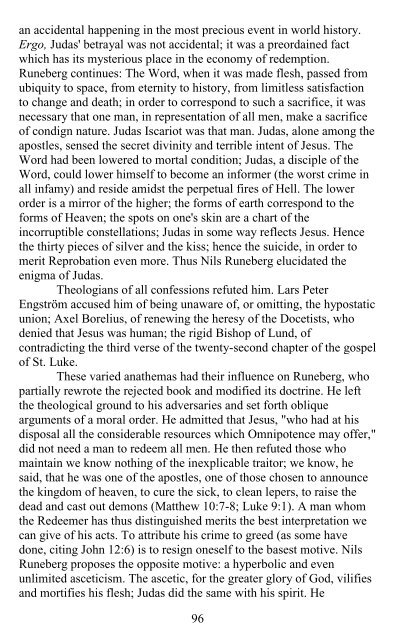Jorge Luis Borges - Labyrinths
Jorge Luis Borges - Labyrinths
Jorge Luis Borges - Labyrinths
You also want an ePaper? Increase the reach of your titles
YUMPU automatically turns print PDFs into web optimized ePapers that Google loves.
an accidental happening in the most precious event in world history.<br />
Ergo, Judas' betrayal was not accidental; it was a preordained fact<br />
which has its mysterious place in the economy of redemption.<br />
Runeberg continues: The Word, when it was made flesh, passed from<br />
ubiquity to space, from eternity to history, from limitless satisfaction<br />
to change and death; in order to correspond to such a sacrifice, it was<br />
necessary that one man, in representation of all men, make a sacrifice<br />
of condign nature. Judas Iscariot was that man. Judas, alone among the<br />
apostles, sensed the secret divinity and terrible intent of Jesus. The<br />
Word had been lowered to mortal condition; Judas, a disciple of the<br />
Word, could lower himself to become an informer (the worst crime in<br />
all infamy) and reside amidst the perpetual fires of Hell. The lower<br />
order is a mirror of the higher; the forms of earth correspond to the<br />
forms of Heaven; the spots on one's skin are a chart of the<br />
incorruptible constellations; Judas in some way reflects Jesus. Hence<br />
the thirty pieces of silver and the kiss; hence the suicide, in order to<br />
merit Reprobation even more. Thus Nils Runeberg elucidated the<br />
enigma of Judas.<br />
Theologians of all confessions refuted him. Lars Peter<br />
Engström accused him of being unaware of, or omitting, the hypostatic<br />
union; Axel Borelius, of renewing the heresy of the Docetists, who<br />
denied that Jesus was human; the rigid Bishop of Lund, of<br />
contradicting the third verse of the twenty-second chapter of the gospel<br />
of St. Luke.<br />
These varied anathemas had their influence on Runeberg, who<br />
partially rewrote the rejected book and modified its doctrine. He left<br />
the theological ground to his adversaries and set forth oblique<br />
arguments of a moral order. He admitted that Jesus, "who had at his<br />
disposal all the considerable resources which Omnipotence may offer,"<br />
did not need a man to redeem all men. He then refuted those who<br />
maintain we know nothing of the inexplicable traitor; we know, he<br />
said, that he was one of the apostles, one of those chosen to announce<br />
the kingdom of heaven, to cure the sick, to clean lepers, to raise the<br />
dead and cast out demons (Matthew 10:7-8; Luke 9:1). A man whom<br />
the Redeemer has thus distinguished merits the best interpretation we<br />
can give of his acts. To attribute his crime to greed (as some have<br />
done, citing John 12:6) is to resign oneself to the basest motive. Nils<br />
Runeberg proposes the opposite motive: a hyperbolic and even<br />
unlimited asceticism. The ascetic, for the greater glory of God, vilifies<br />
and mortifies his flesh; Judas did the same with his spirit. He<br />
96


